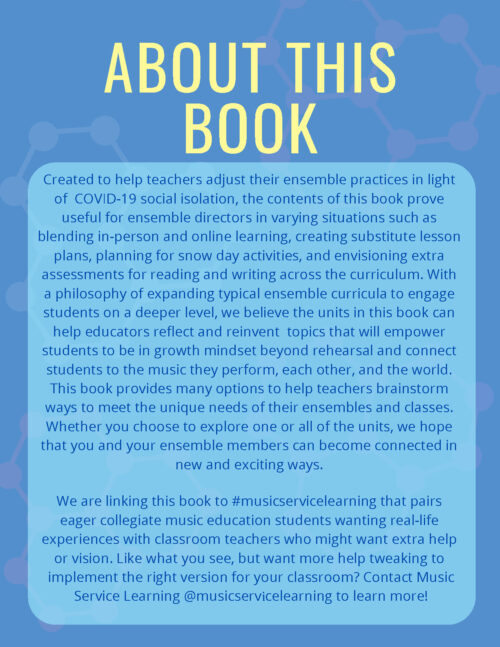Table of Contents
The Gut Level Teacher Reflection
At the end of the 2021 year, a social worker in my district passed along this article about the Gut Level Teacher Reflection. Reflection has always been a part of my life journey. It helps me pause and process my actions and find intentional ways of becoming a better educator, musician, and person. Gut Level Teacher Reflection centers on being in tune with our body and emotional responses. As a new school year is upon us, I invite you to take a few moments during your first few weeks of school to engage with the following questions proposed by Jennifer Gonzalez. I encourage you to bring this into your music department meetings for your department to answer.
- Look around your classroom (or picture it in your mind). What parts of the room make you feel tense, anxious, or exhausted? What parts make you feel calm, happy, or proud?
- Open up your plan book (or spreadsheet, or wherever you keep your lesson plans from the year) and just start browsing, paying attention to how you feel as your eyes meet certain events. What days and weeks give you a lift when you see them, a feeling of pride or satisfaction? Which ones make you feel disappointed, irritated, or embarrassed?
- Take a look at your student roster. What do you feel when you see each name? Which names make you feel relaxed, satisfied, and proud, which ones make your chest tighten with regret, and which ones make your stomach tense?
- Mentally travel from classroom to classroom, picturing each teacher in the building. What are your feelings as you approach each one? Which coworkers give you a generally positive feeling, which ones are neutral, and which ones make you feel nervous, angry, or annoyed?
- Look at the following professional practice “buzzwords.” As you read each one, do you have positive, negative, or mixed feelings? What other words have you heard a lot this year that give you a strong sense one way or the other?
The Gut Level *MUSIC* Teacher Reflection
As I began working through these questions, I immediately asked myself, “How can this be adapted specifically for music teachers?” So, here are the additional questions that I developed. Please feel free to reach out if you have any other questions to add to this list.
- Look at the musical examples you use to teach concepts in your room. Which songs are you most comfortable teaching, least comfortable teaching, or likely to change?
- Think about the genres of music that your students listen to. How often are you incorporating their musical selections? Is your students’ music the primary source of your teaching material, or is this an after-thought? How does incorporating more of their songs make you feel? Anxious, overwhelmed, or inspired?
- Examine your content. From what musical resources are you pulling information? Are you utilizing books from college, pulling ideas from social media, or browsing more recent publications such as those from F-flat? Are these publications written from the Western European perspective, or are you incorporating other perspectives and voices into your research? Does this seem daunting or invigorating to you?
- Think about the music program within your district. What thoughts arise when you think of the program as a whole? What do you think of when thinking about each ensemble or the general music curriculum? Which programs stick out to you? Which classes are successful? How are you measuring the success or failure of the classes or programs?
Reflecting is only the beginning
Completing this gut-level reflection is only the first step. Analyzing your answers will allow you to see what you prioritize and where to invest your energies. Below are five areas that The Gut Level Teaching Reflection suggests to analyze. In addition, I’ve added a few music-specific sections based on the questions I created.
Area 1: Classroom
Area 2: Planning
Area 3: Students
Area 4: Co-workers
Area 5: Professional Practice
Area 6: Music Repertoire & Resources
Area 7: Music Department
From this analysis, you are challenged with creating an action plan, which is arguably the most important part of this journey. First, hone in on where you experienced negative feelings. Can you identify where those feelings are rooted? Are you noticing a pattern or bias? How can you work to change? If you feel confident in some of these areas, find avenues to share that information with others. For example, you can share on your social media accounts, write a blog post, or present the information in a department meeting or professional development seminar.
I look forward to working on my action plan throughout the year. I encourage you to take the time to walk through this process as we embark on a new year. Give yourself permission to feel from your gut. The worst thing that can happen is that you become a better music educator and create a more welcoming and diverse music classroom!
Sources:
Check out more of Hannah’s work in her book, Choral Connections.
What gut-level reflecting are you doing this year? Share your thoughts in the comments!






Leave A Comment